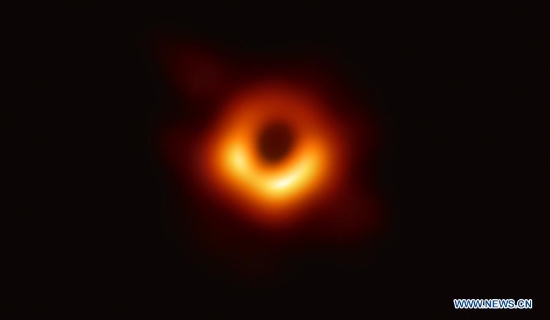| 
Photo provided by the Event Horizon Telescope (EHT) shows the first image of a black hole. (Xinhua/EHT) WASHINGTON, April 10 (Xinhua) -- Astronomers said here Wednesday that they captured the first image of a black hole, unveiling the first direct visual evidence of an unseeable cosmic object and its shadow. An Earth-sized virtual telescope called Event Horizon Telescope (EHT) linking eight ground-based radio telescopes around the globe "saw" the black hole at the center of massive galaxy M87, 55 million light-years from Earth with a mass 6.5 billion times that of the sun. At a press conference, scientists revealed a donut-like structure with a dark central region and a bright ring, which is the black hole's shadow against a disc of glowing gas that falls onto the black hole. It is a "surprising" finding, an "astonishment" and "wonder," giving "the strongest evidence that we have to date for the existence of black holes," Harvard astrophysicist Sheperd Doeleman, EHT's project director, described the image, whose release won immediate applause at the conference. The landmark result offers scientists a new way to study the most extreme objects in the universe predicted by Albert Einstein's general relativity theory. EINSTEIN IS RIGHT Black holes are extremely compressed cosmic objects predicted by Einstein's theory of general relativity. It has a gravitational pull that is so intense that nothing, not even light, can escape it once inside a certain region called the event horizon. Jason Dexter, EHT team member and an astrophysicist with Max Planck Institute for Extraterrestrial Physics, told Xinhua that the size and shape of the shadow are "a prediction of general relativity and detecting it would be the best evidence for the existence of a black hole in the universe." | 
 News
News Business
Business Education
Education Travel
Travel Photos
Photos





